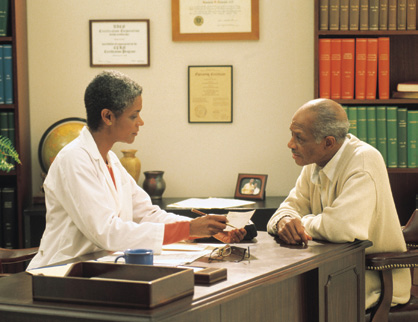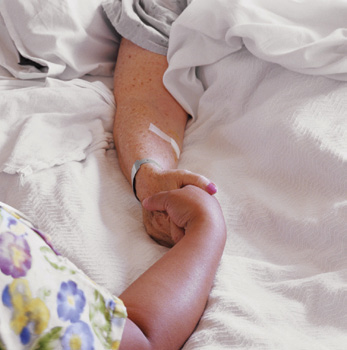
Support for People With Cancer
Coping With
Advanced Cancer
National Cancer Institute
U.S. DEPARTMENT
OF HEALTH AND
HUMAN SERVICES
National Institutes
of Health


For more information . . .
This booklet is only one of many free booklets for people with cancer. Here are some others you and your loved ones may
find useful:
• Chemotherapy and You
• Eating Hints for Cancer Patients
• Taking Part in Cancer Treatment Research Studies
• Pain Control
• Radiation Therapy and You
• Taking Time: Support for People With Cancer
• Thinking About Complementary and Alternative Medicine: A Guide for People With Cancer
• When Your Parent Has Cancer: A Guide for Teens
• When Someone You Love Is Being Treated for Cancer:
Support for Caregivers
• When Someone You Love Has Advanced Cancer: Support for Caregivers
These booklets are available from the National Cancer Institute (NCI). To learn more about the specific type of cancer you
have or to request any of these booklets, visit NCI’s website
(http://www.cancer.gov). You can also call NCI’s Cancer Information Service at 1-800-4-CANCER (1-800-422-6237) to speak with
an information specialist.






Coping With Advanced Cancer
“What lies behind us
and what lies before us
are tiny matters
compared to what lies
within us.”
—Ralph Waldo Emerson


Contents
1. About This Booklet ............................................................................... 1
2. Making Choices About Care ............................................................... 3
3. Talking With Your Health Care Team ................................................ 9
4. Getting Help for Your Symptoms .....................................................13
5. Coping With Your Feelings ...............................................................21
6. Advance Planning ...............................................................................31
7. Talking With the Special People in Your Life ..................................35
8. Looking for Meaning ..........................................................................39
9. Closing Thoughts ................................................................................43
10. Resources .............................................................................................44
11. Words to Know ....................................................................................47
12. Personal Affairs Worksheet ...............................................................50

“I have good days and bad
days. But I try to let there
be more good ones than
bad, and focus on things in
my life that I can control.
I just do the best I can,
enjoying family, friends,
and the little things in
life.”—Louise


C H A P T E R 1
About This Booklet
You’ve struggled with the diagnosis, treatment, and maybe the recurrence of cancer. Now doctors may have told you that you have advanced cancer. They may have said that your cancer is not responding to treatment and that long-term remission is no longer likely. Or they may have said they have run out of standard treatment options. However you learn the news, it can be devastating to you and your loved ones. Often it’s hard to believe or accept at first.
Having advanced cancer can bring anxiety and uncertainty to your life. But some people with advanced cancer live far longer than expected. And remember, you are still in control of your choices and actions. Having an advanced disease can be a time of personal growth.
It can even be a time of second chances. Many people say they started to see life in a new way after learning that their cancer had progressed despite treatment. They realized the importance of making the most of each day.
This booklet stresses four main points:
■
Learning more about ways you can help yourself may ease some of your concerns.
■
Your treatment may change, but as always, you deserve to ask for and receive good medical attention from your health care team and support from your caregivers.
■
It’s important to talk about your worries, frustrations, and problems, and get support from others. In fact, it may be one of the best things you can do for yourself.
■
As your medical care changes, you still have many choices. You can choose the way you wish to live each day.
“There are lots of things I still want to do, but I know that I may not be able to do them the way I planned. But that doesn’t stop me from trying to achieve them in a different way.” —Millie
Reading This Booklet
No two people are alike. Some chapters of this booklet may apply to you, while others may not. Or some may be more useful later on. As you read this booklet, choose the parts that are right for you. Share it with your family members and loved ones. They may find it helpful to read it with you. Keep in mind that this booklet is for you, an adult with advanced cancer, and the people close to you. For other information for a parent or loved one of a child or young person with cancer, see the NCI booklet, Young People With Cancer. Your friends and family members may also want to see the NCI booklet, When Someone You Love Has Advanced Cancer.
1
Above all else, try to remember that you are still in charge of your life. It may be hard to do this with all that you are going through. You may have trouble coping with your feelings from time to time. Or you may be grieving that your life has gone a different way than you had hoped. It’s natural to feel negative at times. You’ll have ups and downs.
We hope this booklet will help you. Our goal is to help you stay in control as much as you can, and make the rest of your life fulfilling and satisfying. You can still have hope and joy in your life, even as you cope with what lies ahead.
2

C H A P T E R 2
Making Choices About Care
People have different goals for care when dealing with advanced cancer. And your goals for care may be changing. Perhaps you had been hoping for a remission. Yet now you need to think more about controlling the spread or growth of the cancer. Your decisions about treatment will be very personal. You will want to seek the help of your loved ones and health care providers. But only you can decide what to do. Your desire to avoid future regrets should be measured against the positives and negatives of treatment.
Questions you may want to ask:
■
What’s the best we can hope for by trying another treatment? What is the goal?
■
Is this treatment plan meant to help side effects, slow the spread of cancer, or both?
■
Is there a chance that a new treatment will be found while we try the old one?
■
What’s the most likely result of trying this treatment?
■
What are the possible side effects and other downsides of the treatment? How likely are they?
■
Are the possible rewards bigger than the possible drawbacks?
It is important to ask your health care team what to expect in the future. It’s also important to be clear with them about how much information you want to receive from them.
Comfort Care
You have a right to comfort care both during and after treatment. This kind of care is often called palliative care. It includes treating or preventing cancer symptoms and the side effects caused by treatment. Comfort care can also mean getting help with emotional and spiritual problems during and after cancer treatment. Sometimes patients don’t want to tell the doctor about their symptoms. They only want to focus on the cancer. Yet you can improve your quality of life with comfort care.
People once thought of palliative care as a way to comfort those dying of cancer. Doctors now offer this care to all cancer patients, beginning when the cancer is diagnosed. You should receive palliative care through treatment, survival, and advanced disease. Your oncologist may be able to help you. But a palliative care specialist may be the best person to treat some problems. Ask your doctor or nurse if there is a specialist you can go to.
3

“There’s a part of me that
wants to keep fighting
and try a clinical trial; the
other part wants to stop
fighting. I’m just so tired
of it all. Yet I can’t help
wondering if there are
other options.” —John
4
Your Choices
You have a number of options for your care. These depend on the type of cancer you have and the goals you have for your care. Your health care team should tell you about any procedures and treatments available, as well as the benefits and risks of those treatments.
Options include:
■
Clinical trials
■
Palliative radiation, chemotherapy, or surgery
■
Hospice care
■
Home care
Many patients choose more than one option. Ask all the questions you need to.
Try to base your decision on your own feelings about life and death, and the pros and cons of cancer treatment. If you choose not to receive any more active cancer treatment, it does not necessarily mean a quick decline and death. It also does not mean you will stop being given palliative care. Your health care team can offer information and advice on options.
You also may want to talk about these options with family members and others who are close to you.
Clinical Trials
Treatment clinical trials are research studies that try to find better ways to treat cancer.
Every day, cancer researchers learn more about treatment options from clinical trials. The different types of clinical trials are:
■
Phase 1 trials test how to give a drug, how often it should be given, and what dose is safe. Usual y, only a small number of patients take part.
■
Phase 2 trials discover how cancer responds to a new drug treatment. More patients take part.
■
Phase 3 trials compare an accepted cancer treatment (standard treatment) with a new treatment that researchers hope is better. More treatment centers and patients take part.
If you decide to try a clinical trial, the trial you choose will depend on the type of cancer you have. It will also depend on the treatments you have already received. Each study has rules about who can take part. These rules may include the patient’s age, health, and type of cancer. Clinical trials have both benefits and risks. Your doctor and the study doctors should tell you about these before you make any decisions.
Taking part in a clinical trial could help you and help others who get cancer in the future.
But insurance and managed care plans do not always cover costs. What they cover varies by plan and by study. Talk with your health care team to learn more about coverage for clinical trials for your type of cancer.
5

“I know that just because
I have stage-4 cancer
doesn’t mean I’m going to
die tomorrow. My friend
has lived a long time with
her advanced cancer.” —Li
6



For more information about clinical trials, see NCI’s booklet, Taking Part in Cancer Treatment Research Studies. Or talk to the NCI’s Cancer Information Service at 1-800-422-6237 (1-800-4-CANCER).
Palliative Radiation, Chemotherapy, or Surgery
Some palliative chemotherapy and palliative radiation may help relieve pain and other symptoms. In this way, they may improve your quality of life, even if they don’t stop your cancer. These treatments may be given to
remove or shrink a tumor. Or they may
be given to slow down a tumor’s spread.
Palliative surgery is sometimes used to
relieve pain or other problems.
For more information, see the NCI booklets
Chemotherapy and You and Radiation
Therapy and You.
Hospice
Hospice care is an option if you feel you are no longer benefiting from cancer treatments.
Choosing hospice care doesn’t mean that you’ve given up. It just means the treatment goals are different at this point. It does not mean giving up hope, but rather changing what you hope for. But be sure to check with the hospice you use to learn what treatments and services are covered. Check with your insurance company also. The goal of hospice is to help patients live each day to the fullest by making them comfortable and lessen their symptoms.
Hospice doctors, nurses, spiritual leaders, social workers, and volunteers are special y trained. They are dedicated to supporting their patients’ and families’ emotional, social, and spiritual needs, as well as dealing with patients’ medical symptoms.
People usual y qualify for hospice services when their doctor signs a statement that says that patients with their type and stage of disease, on average, aren’t likely to survive beyond 6 months. Many people don’t realize that they can use hospice services for a number of months, not just a few weeks. In fact, many say they wish they had gotten hospice care much sooner than they did. They were surprised by the expert care and understanding that they got. Often, control of symptoms not only improves quality of life but also helps people live longer. You will be reviewed periodical y to see if hospice care is still right for you. Services may include:
■
Doctor services (You may still keep your own doctors, too.)
■
Nursing care
■
Medical supplies and equipment
■
Drugs to manage cancer-related symptoms and pain
7
■
Hospice and Home Care
Short-term in-patient care
■
Homemaker and home health
What to Expect With Hospice Care
aide services
You can get hospice services at home, in
■
Respite (relief) services for caregivers.
special facilities, in hospitals, and in nursing
This means someone else helps with
homes. They have specialists to help guide
care for awhile, so the caregiver can
care. They also have nurses on call 24 hours
take a break
a day in case you need advice. And they
■
Counseling
have many volunteers who help families care
■
Social work services
for their loved one. Some hospices will give
■
palliative chemotherapy at home as well.
Spiritual care
Hospice care doesn’t seek to treat cancer, but
■
Bereavement (grief) counseling
it does treat reversible problems with brief
and support
hospital stays if needed. An example might
■
Volunteer services
be pneumonia or a bladder infection.
Medicare, Medicaid, and most private
Home Care
insurers cover hospice services. For those
without coverage and in financial need,
Home care services are for people who are at
many hospices provide care for free. To learn
home rather than in a hospital. Home care
more about hospice care, call the National
services may include:
Hospice and Palliative Care Organization
■
Monitoring care
at 1-800-658-8898. Or visit their website at
■
Managing symptoms
http://www.nhpco.org. The website can also
■
help you find a hospice in your community.
Providing medical equipment
■
Physical and other therapies
Benefits of Hospice and Home Care
You may have to pay for home care services
Hospice and home care professionals can
yourself. Check with your insurance
help you and your family work through
company. Medicare, Medicaid, and private
some tough emotional issues. A social
insurance will sometimes cover home care
worker can offer emotional support, help in
services when ordered by your doctor. But
planning hospice or home care, and ease the
some rules apply. So talk to your social
move between types of care. Many people
worker and other members of your health
prefer the comfort of their own home,
care team to find out more.
familiar surroundings, and having friends
and family members nearby. Getting health
care at home gives family members, friends,
and neighbors the chance to spend time
with you and help with your care.
8





C H A P T E R 3
Talking With Your Health Care Team
As your disease advances, it’s still important to give feedback to your doctor. That’s the only way he or she can know what is working for you. Many people have a treatment team of health providers who work together to help them. This team may include doctors, nurses, oncology social workers, dietitians, and other specialists. They need to ful y know your desires during treatment and at the end of your life. Let them know about any discomfort you have. You have a right to live your remaining days with dignity and peace of mind. So it’s important to have a relationship and an understanding with those who will be caring for you.
Here are just a few topics you may want
to discuss with your doctor or other
members of your health care team:
■
Pain or other symptoms. Be
honest and open about how you feel.
Tell your doctor if you have pain
and where. Also tell him or her what
you expect in the way of pain relief.
(See Chapter 4 for more about pain
and other symptoms.)
■
Communication. Some people
want to know details about their care. Others prefer to know as little as possible. Some patients want their family members to make most of their decisions. What would you prefer? Decide what you want to know, how much you want to know, and when you’ve heard enough. Choose what is most comfortable for you, then tell your doctor and family members. Ask that they follow through with your wishes.
■
Family wishes. Some family members may have trouble dealing with cancer. They don’t want to know how far the disease has advanced or how much time doctors think you have. Find out from your family members how much they want to know, and tell your health care team their wishes. Do this as soon as possible. It will help avoid conflicts or distress among your loved ones. (See Chapter 7 for more on talking to your loved ones.) Remember that only you and those closest to you can answer many of these questions.
Having answers to your questions can help you know what to expect now and in the future.
“My doctor said, ‘The cancer is spreading to your lungs,’ and from that moment on, I didn’t hear a word he said. He started talking about my options, but all I saw were lips moving. I was in total shock.” —Tyrone 9

“I told the doctor when I first
met him that I needed honesty
from him; otherwise, I didn’t
want to work with him. So
he promised me he would be
honest, and he was. He said,
‘You’ve got stage-4 lung cancer.
You have 3 months to 2 years if
everything works well.’ I needed
to know everything.”—Patrice
10



Tips for Meeting With Your
No One Knows the Future
Health Care Team
It’s normal for people to want to
know how long they will have to
■
Make a list of your questions before
each appointment.
live. It’s also natural to want to
prepare for what lies ahead. You
■
Bring a family member or trusted friend
may want to prepare emotionally
with you to your medical visits. This person
can help you remember what the doctor or
as well as to make certain
nurse said, and talk with you about it after
arrangements and plans.
the visit.
But predicting how long someone
■
Ask all your questions. If you do not
will live is not exact. Your doctor
understand an answer, keep asking until
may be able to give you an estimate,
you do. There is no such thing as a
but keep in mind that it’s a guess.
“stupid” question.
Every patient is different. Your
■
Take notes. You can do this or you can ask
doctor has to take into account
a family member or friend to take them
your typ
































